|
|
|
Sort Order |
|
|
|
Items / Page
|
|
|
|
|
|
|
| Srl | Item |
| 1 |
ID:
135054
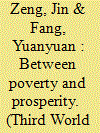

|
|
|
|
|
| Summary/Abstract |
Despite China’s rapid economic growth in the past three decades, Chinese officials and experts are increasingly worried that the country is slowly heading towards the ‘middle-income trap’. The fear is that China might suffer the same stagnation and turbulence as Latin American economies did in the 1980s and 1990s. Will China be able to avoid this trap? Building on the insights of world-systems theory, this paper argues that China’s dependent development, although enabling it to escape the ‘poverty trap’, is likely to bog it down in the ‘middle-income trap’. China’s heavy reliance upon foreign technologies and investment has harmful effects on its economy. Dependent development not only increases China’s economic vulnerability but also truncates domestic industries. To escape the trap, the Chinese state should play a more active role in shifting its growth model away from low-end commodity manufacturing to knowledge-based, high value-added activities.
|
|
|
|
|
|
|
|
|
|
|
|
|
|
|
|
| 2 |
ID:
135057
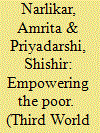

|
|
|
|
|
| Summary/Abstract |
After over a decade of languishing in stalemate, the Doha Development Agenda – the first round of trade negotiations launched under the auspices of the World Trade Organization – finally achieved a breakthrough at the Bali ministerial in 2013. Given that the Doha mandate places development – and particularly the concerns of the Least Developed Countries (ldcs) – at the heart of its agenda, our paper focuses on what the Bali outcome means for the world’s poorest countries. As a first step we provide a brief background against which the Bali negotiations took place. In the second section we assess the achievements and limitations of the Bali outcome, focusing on the ldc-specific package and also commenting on other issues that affect the ldcs. In the third section we explain the reasons for some of the achievements at Bali, which include negotiating strategies used by the ldcs themselves. In the fourth and final section we identify a plan of action for the future.
|
|
|
|
|
|
|
|
|
|
|
|
|
|
|
|
| 3 |
ID:
135036
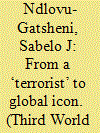

|
|
|
|
|
| Summary/Abstract |
This article examines Nelson Rolihlahla Mandela’s political life and legacy from the perspective of critical decolonial liberation ethics, which privileges a paradigm of peace, humanism and racial harmony and opposes the imperial/colonial/apartheid paradigm of war, racial hatred and separation of races. This system emerged in the 15th century and was driven by the desire to conquer, dispossess, colonise, exploit and segregate people according to race and, alongside imperatives of primitive accumulation, it informed the colonisation of South Africa and the imposition of apartheid. Mandela was a liberation fighter who provided an antidote to the colonial ideology of racial profiling and hierarchisation. What distinguished him from other freedom fighters was his commitment to the cause of human rights as early as the 1960s, long before it attained its status as a constitutive part of global normative order. When Mandela became the first black president of a democratic South Africa, his practical and symbolic overtures to whites and his reconciliatory politics aimed to call them back to a new inclusive humanity. Critical decolonial ethics logically enables a tribute to Mandela that privileges his commitment to a post-racial society and new humanism.
|
|
|
|
|
|
|
|
|
|
|
|
|
|
|
|
| 4 |
ID:
135058


|
|
|
|
|
| Summary/Abstract |
Despite its growing status as an ‘emerging’ power, perceptions of India’s current and future role in multilateral organisations continue to be overshadowed by its reputation for blocking rather than supporting progress in multilateral negotiations on grounds of national sovereignty and Third Worldism. In this article we suggest a more positive interpretation of India’s role through a close analysis of its diplomacy during the 2001 Doha Ministerial Conference of the World Trade Organisation (wto). The Indian delegation attempted proactively to shape the agenda of the negotiations and to promote a form of developmental multilateralism that might correct the perceived imbalances within the substantive commitments to and structure and processes of the wto. India failed to get its way at the time, but the ongoing deadlock at Doha demonstrates the continuing salience of such alternative conceptions of global justice.
|
|
|
|
|
|
|
|
|
|
|
|
|
|
|
|
| 5 |
ID:
135040
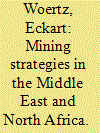

|
|
|
|
|
| Summary/Abstract |
This article provides a mapping exercise of the economic importance of non-hydrocarbon minerals (nhm) in the Middle East and North Africa (mena) and shows how governments in the region increasingly perceive them as strategic resources. The focus is on Saudi Arabia and other Gulf countries, Turkey, Morocco and Iran. nhm like iron ore, phosphates, aluminium and uranium are important for development models in the region, either as export commodities or as vital input factors. Since the 1990s, and as elsewhere in the world, the sector has witnessed privatisation and the promulgation of new mining codes. Yet governments have retained core capabilities and manage most key commodities themselves either directly or indirectly. Mining projects have met with opposition from labour representatives. They also have considerable environmental impact. The article discusses rentier state and resource curse theories, but argues that nhm have also increased development options and have contributed to economic diversification rather than being just a curse.
|
|
|
|
|
|
|
|
|
|
|
|
|
|
|
|
| 6 |
ID:
135039


|
|
|
|
|
| Summary/Abstract |
Because of the absence of evidence to show for its utility, the notion of ‘development’ has been fraught with many debates over the years. This paper is concerned with re-examining the future of development studies, based on its past and present trajectories. The argument here is that development may be useful if its norms and practices become context-specific and are made to benefit its purported beneficiaries. The chronology spans the period after World War II to the present day, and thus covers theories that envision alternatives. While this chronology is overlapping, we hope to show that development studies has been marked by both continuities and discontinuities.
|
|
|
|
|
|
|
|
|
|
|
|
|
|
|
|
| 7 |
ID:
135060


|
|
|
|
|
| Summary/Abstract |
The current international development discourse focuses much on the Millennium Development Goals (mdgs) as part of a global social contract in support of international cooperation and governance, with the debate on the post-mdgs and the Sustainable Development Goals (sdgs) indicating a shift. These goals are at least in part addressing developmental constraints confronting the world as a result of the effects the dominant growth models have had on limited resources and global goods. Rio+20 was a forum which brought to the fore the conflicting issues at stake and the challenges for any development paradigm seeking to enhance global justice and equality. This article explores the discrepancies between dominant paradigms cultivated in official discourses, on the one hand, and alternatives for another development presented as anti-hegemonic counter-models for survival strategies. It considers the role of civil society agencies and scholar activists in development studies.
|
|
|
|
|
|
|
|
|
|
|
|
|
|
|
|
| 8 |
ID:
135056
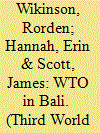

|
|
|
|
|
| Summary/Abstract |
The conclusion of the World Trade Organization’s (wto) ninth ministerial meeting – held in Bali 3–7 December 2013 – is at one and the same time momentous, marginal and business-as-usual. It is momentous because it marks the first multilateral agreement reached in the wto since the organisation began operations on 1 January 1995; it is marginal because the deal reached will have only a limited impact on the global trading system; and it is business as usual because the Bali package will be of disproportionally greater value to the industrial states than to their developing and least developed counterparts. We examine what happened in Bali, covering the principal issues at stake and the content of the outcome, what this means for the wto and for the Doha Development Agenda (dda), and why it all matters. We argue that, while the Bali ministerial is significant and the agreements reached important, the conclusion of the meeting and the package agreed represent only a limited movement forward in addressing the fundamental problems and inequities of the wto system.
|
|
|
|
|
|
|
|
|
|
|
|
|
|
|
|
|
|
|
|
|